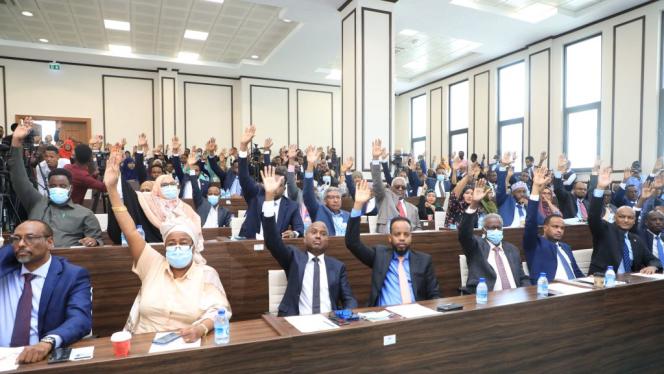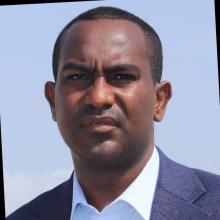Tuesday 30 April 2024
Somalia’s new constitution threatens balkanizing the republic

Somalia’s new constitution lacks widespread buy-in. Proceeding with it threatens the further balkanization of what remains of the shattered republic
The events of March 30, 2024, marked a pivotal moment in Somalia’s political landscape, stirring debate and drawing widespread public attention. The decision by the federal parliament to amend the provisional constitution, the cornerstone of Somalia’s federal system since its endorsement in 2012, has emerged as another polarising issue in Somali politics, with potentially serious ramifications.
Following the amendment, Puntland promptly declared “it was withdrawing from the federal system” and declared Hassan Sheikh Mohamud an illegitimate president. This declaration came after Puntland had already expressed concerns about the proposed amendments, warning against changes to the federal constitution without consensus, and highlighting the potential for further division if it is implemented without Puntland. Abdirahman Farole, a former Puntland president said in an interview with BBC Somalia: “where is the constitution? The constitution is gone.”
Prior to Puntland's announcement, key political opposition figures had also voiced their reservations about the proposed amendments. Former presidents, prime ministers, and parliamentarians called for the postponement of the amendments until key contentious issues could be resolved. Despite these warnings, President Hassan Sheikh Mohamud and a select group of supporters, including speaker of parliament Adan Madobe, chose to proceed.
The new changes include provisions that could grant the federal president additional powers, such as appointing and removing the prime minister, extending the presidential term from four to five years, and establishing the national electoral commission without the involvement of the regional states.
Reports have emerged alleging bribery and promises of appointments to sway MPs to vote for the amendments. Speaker Adan Madobe and his deputies, both in the lower and counterparts in the senate, are said to have spearheaded this process, benefiting significantly from these alleged inducements.
The irony of Saturday's voting lies in the fact that many MPs reportedly did not even see or read the draft of the amendments they voted for; they simply raised their hands in favour. In a post on X, formerly Twitter, veteran MP Abdirahman Abdishakur wrote: “I asked fellow legislators who voted in favor if the final version had been presented, and they said no. I then asked them what they had endorsed, and they responded by saying, "We don't know, we just voted."”
With Puntland asserting its autonomy, Somaliland having declared independence, and the possibility of other regions following suit, Somalia, as it was known under the 1960 constitution, appears to be heading towards further balkanization. The failure to heed warnings and the pursuit of self-interest over unity has brought Somalia to this critical juncture.
Historical context sheds light on the roots of Somalia’s current predicament. The failure to achieve consensus and the rise of clan-based politics further exacerbated divisions and distrust, leading to the current state of fragmentation.
The Somali republic was formed when British Somaliland and its Italian counterpart in the south merged in July 1960 marking the adoption of its inaugural constitution and paving the way for the first referendum in 1961. However, this unity was shattered when the dictator Mohamed Siad Barre took power in a coup in 1969, bombing cities in the north (now Somaliland), resulting in the deaths of thousands of innocent individuals and the displacement of millions in the 1980s.
I recall listening to local news in the mid 1990s as northern politicians, including prominent figures like Abdirahman Tuur, advocated for unity while stationed in the capital, Mogadishu. Amidst this turmoil, warlords like General Mohamed Farah Aideed and Ali Mahdi Mohamed unilaterally claimed the presidency, only to engage in conflict with each other despite hailing from the same clan group. Meanwhile, Colonel Abdullahi Yusuf Ahmed and his SSDF forces also sought involvement in a power-sharing government that never fully materialised.
Frustrated with the ongoing chaos, northern politicians declared independence for Somaliland on May 18, 1992, while Puntland declared itself a self-governing regional state in 1998. The rest of Somalia remained engulfed in lawlessness, plagued by warlords and rival militia groups.
In some ways, today’s developments mirror those of the past. Had then southern politicians prioritised consensus and acknowledged that Mogadishu alone could not govern Somalia, perhaps the country would not have descended into anarchic politics and weak and unstable governance.
Within this federal system, clan and political rivalries persist unabated. Relations between Mogadishu and the federal member states, each representing different clans, have consistently been tense. President Hassan Sheikh Mohamud’s return to power after a heated and polarised election in May 2022 did not signal unification. Instead, he pledged to prioritise the interests of his clan, which had been deeply dissatisfied with the preceding Farmaajo administration. This move raised suspicions among other clans and factions, further complicating efforts towards reconciliation and unity. Regrettably, this mindset persists.
The lack of true reconciliation in Somalia has perpetuated a cycle of violence and impunity. Perpetrators of crimes during the civil war and bloodshed under the dictatorship era have evaded accountability, while victims continue to seek justice. This unresolved trauma, coupled with the political upheavals, economic marginalisation and abuses of the past, has bred deep-seated mistrust among different groups, hindering efforts towards unity and stability.
The current federal system, established in 2004 through an international community-brokered process in Mbagathi, Kenya, was intended to resolve the Somali protracted civil war and lawlessness. However, it has inadvertently deepened divisions along clan lines, exacerbating political rivalries instead of relieving it. Despite two decades under this system, challenges persist, with corruption and power-hungry leaders thwarting expected progress.
However, one may question whether the provisional constitution adopted on August 1, 2012, by 825 clan delegates can truly be considered the solution.
Indeed, the provisional constitution, which I was among a few journalists who were covering its endorsement, served as a starting point for what was intended to be a gradual, methodical process of state-building. Following the conclusion of the transitional government in 2012, Somali leaders had ample opportunity to progress cautiously by prioritising the restoration of peace and security, the establishment of functioning institutions, the resolution of the Somaliland case, and the preparation for a referendum to review and ratify the provisional constitution through popular vote, ultimately leading to a direct election. Yet, chronic corruption and the prevalence of power-hungry and incompetent leaders emerged as significant obstacles to the anticipated progress. This also gave al-Shabaab a good excuse and reason to recruit.
In 1990, the civil war erupted after Siad Barre rejected calls for inclusive dialogue, leading to the conflict escalating. Now, twenty years after the adoption of the federal system and thirty-four years after the onset of the deadly Somali civil war, the same scenario persists with even greater severity. Mogadishu continues to struggle to resolve disputes amicably and seek consensus, perpetuating instability. Moreover, the resurgence of terrorist groups like al-Shabaab and the prevalence of piracy, coupled with deepening internal fragmentation among Somalis, pose significant risks.
In conclusion, while the international community unquestionably has a role to play, it is imperative for Somali leaders and various factions to demonstrate compromise and humility. They must heed the popular saying, ‘Rag walaalow wuxuu ku dhaamo lawaa,’ which emphasises the importance of addressing issues with respect and fraternity. Unilateral actions will not propel the country and its people forward; instead, they will only serve to derail progress.






